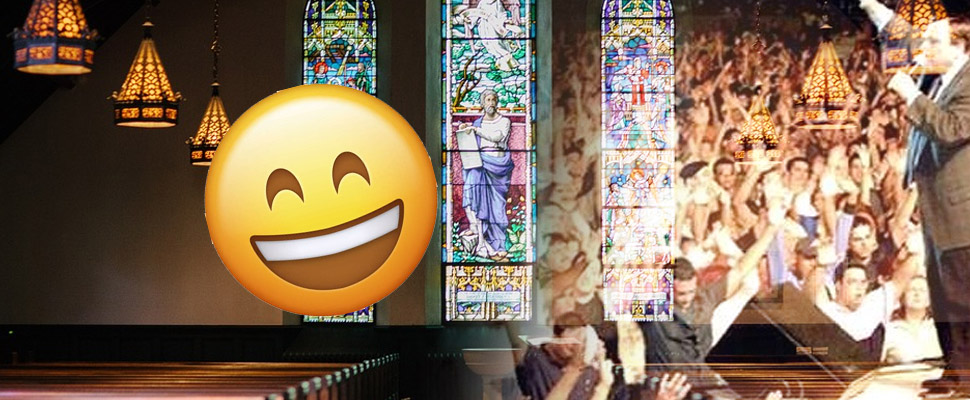Is religion the key to building the happiness of a country?
Listen this article
Various studies and research have been conducted to show if there is a relation between religious beliefs and happiness

According to an intensive study of Pew Research, (an NGO dedicated to providing information on controversies, attitudes, and trends in the United States and other countries of the world) on the influence of religion on the happiness of the human being; they assure that a devout person or practitioner of some religious groups is happier, healthier and more committed to their community.
Leer en español: ¿Es la religión la clave para construir la felicidad de un país?
In order to cover not only the religious population, but also the rest of the inhabitants who have other practices, the researchers carried out massive surveys in several countries of the world from all continents (China, France, Uruguay, Spain, Argentina, Russia, Colombia , Germany, South Africa, United States among others); dividing the inquired into three categories: the "active religious", who participate in some religious cult at least once a month; the "religious inactive", those who in one way or another identify with the religion but do not attend frequently and the "unaffiliated", that are the ones that do not identify with any religion.
There, they were able to find out several discoveries about the link between religion, health, happiness, and civic commitment:
1. They noted that in the United States 36% of people active in religion describe themselves as "very happy", compared to 25% of inactive religious and 25% of non-members.
2. Although there is no clear link between religiosity and a good state of health, (even after checking the factors that could affect the results such as age, income and gender); Countries such as the United States, Taiwan and Mexico are only 3 of the 26 nations in which a religiously active person reports a good state of health.
3. People who tend to attend religious meetings are more likely to join other types of non-religious organizations such as charities and clubs. Because in 12 of the 26 countries surveyed, active religious manifest greater civic commitment.
4. Last but not least, according to the exhaustive studies of the NGO Pew Research in Spain, 83% of religious people say they vote in each electoral period, compared to 62% of the inactive and 53% of the unaffiliated
But, what is the purpose of this NGO when conducting this research? According to the information published on the website of this non-profit organization, founded in 1948 in the United States, its mission is to serve the interest of public opinion, through research to stimulate civic life. And what are their values? What are its roots? Although nowadays "The Pew Charitable Trusts", (who finances the center of the projects of Pew Research Center), is not partisan nor ideological; its founders Joseph N. Pew and his wife Mary Anderson Pew were politically conservative.
Maybe you're interested in reading: UN: "Without women in politics, human rights and peace would be at risk"
But beyond the percentages obtained, will there be any other answer?
Although the results of Pew Research show that leading a religiously active life stimulates the level of happiness, religion is not always so benevolent after all. It also has its death toll as for example if we analyze the cases of mass suicides that have occurred in different religious centers.
On November 18, 1978, in Guyana, 914 religiously active people committed suicide in the "Temple of the People" facilities under the instructions of their leader Jim Jones, prompting them to ingest cyanide mixed with grape juice.
On the other hand, one of the events known nowadays as the most atrocious collective suicide in history, was presented in Uganda, a country located in East Africa; where the 800 followers of the religious group called "Restoration of the Ten Commandments of God" headed by Josep Kibweteere, locked themselves in their church, closing doors and windows and then setting fire to the place of congregation.
With these and other atrocious events, it is inevitable to ask, at what level of happiness would they be to commit such acts?
Politicized religion
If you look at the statement of the NGO Pew Reseach, in which they state that an actively religious person is more likely to engage with their community, especially in the political sphere; participating in the electoral periods, they are certainly not far from reality. Because as they affirm, countries like Spain and the United States have one of the highest percentages of electoral participation on the part of actively religious people. But do these organizations or religious leaders have any particular purpose when participating in an election day or political campaign?
According to the Evangelical Council of Colombia (Codecol), in Colombia, there are around 5,000 evangelical churches and an average of 89 requests are received monthly for the foundation of new congregations. Which explains its electoral abundance capable of bringing to the Senate pastors such as Carlos Baena, Maria Luisa Piraquive, founders of the Church of God Ministerial of Jesus Christ International, who today are in cases related to money laundering.
Returning to the Pew Research study, they say that "active religious tend to be older, a little less educated and more likely to be married". So this leads to the question: What professions or what type of formation do most religious leaders have?
LatinAmerican Post | Julieta Gutiérrez
Translated from "¿Es la religión la clave para construir la felicidad de un país?"





